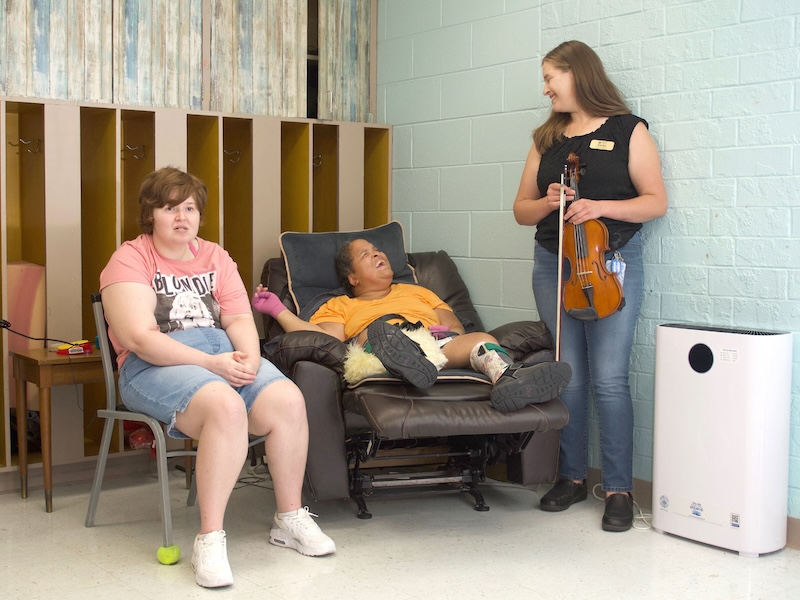We have thousands of human-written stories, discussions, interviews and reviews from today through the past 20+ years. Find them here:
Playing Violin at a School for People with Intellectual and Developmental Disabilities
Why do we play the violin? Sometimes it is because our parents say we must learn an instrument. Sometimes it is because we want to play an instrument and do not want to play in band. Maybe it is because we play it better than any other instrument. Notice that all the reasons have "us" at the center. "I" like. "I" prefer. "My parents" tell me.
When we become adults, the focus on ourselves often does not change. Instead, we are focused on auditioning to study at prestigious universities, playing in illustrious symphonies, and teaching at reputable schools. And the focus is still on me, myself, and I. How often do we consider how we can bring joy to other people with the ability we have been blessed with?
Recently I have the honor and privilege of playing the violin at Orange Grove Center in Chattanooga, Tennessee - and that has made me consider some of those other reasons for playing - the reasons that go beyond "me."
Orange Grove is a school that was founded in 1953 for children with intellectual and developmental disabilities (IDD). The parents of these children did not want to send their children to institutions for the "mentally retarded," such as Willowbrook, White Haven, and Pennhurst. So they started their own school where the children are treated with dignity and respect.

Playing for residents at Orange Grove Center. Photo by Dennis Wilkes.
For a year and a half, I have been playing the violin here at Orange Grove, and I have seen many people enjoy the music I play. I play a variety of songs from jigs and folk tunes to classical music and pieces I improvise. The repertoire I play in each room is not pre-determined. On the contrary, I assess the room when I enter. If the room is peaceful, I will usually start by joining the peaceful atmosphere with a song like "Jesu, Joy of Man’s Desiring" or "The Water is Wide."
Sometimes the room has a lot of energy, and I can sense that playing an exciting song would encourage everyone to be too animated. In these cases, I will also play a peaceful song. Yet there are other times, perhaps on a rainy day, when I know that the people in this classroom need some energy and joy. In these cases, I will play a cheerful song, such as "Ding Dong Merrily on High" or "Simple Gifts." These songs are bouncy, often prompting smiles.
Perhaps the most enjoyable part of playing the violin at Orange Grove is watching the individuals’ reactions to my music.

Interacting with residents at Orange Grove Center. Photo by Dennis Wilkes.
Orange Grove is the first place where I have played someone to tears. One boy cried when I played "Fur Elise." It was his favorite, among the songs that I played. I realized that he really loved the piece when he cried the next week and the next. From then on, I made a point to play "Fur Elise" for him.
Another gentleman at Orange Grove really enjoys classical music. He will sing along to Mendelssohn’s "Spring Song" and other songs he recognizes. His favorite song in my current repertoire is Hungarian Dance No. 5 by Brahms. Since the first time I played it for him, he will dance a polka in his chair during the song and say "Huh!" The other individuals and staff in his room smile and laugh. We all have a great time because he enjoys this song so much.
"Czardas" is becoming a new favorite piece in several classrooms. I enjoy watching people’s reaction when I start playing the "Allegro vivo" section - because it is so different from the beginning. The beginning is calm and pensive, so people are usually relaxed when I play it. However, when I start the "Allegro vivo," people become excited. Some people smile, some people stare at me in disbelief, and some nod their heads to the beat. I also like to watch and see how long individuals will focus on my playing during "Czardas." While they may not typically have a long attention span, "Czardas" is so captivating that they will listen attentively longer than they would to other pieces.
So, I ask again, why do we play the violin? Perhaps we started playing because our parents told us we were going to learn or because we like how the violin sounds, but I believe that we keep playing because of the joy it brings to us and to others. The most rewarding thing we can do is to play for other people’s enjoyment.
You might also like:
- Vijay Gupta at ASTA/SAA 2024: Music as a Place of Possibility
- Music in Hospice
- The Gift: A Violin for Prison Inmates
* * *
Enjoying Violinist.com? Click here to sign up for our free, bi-weekly email newsletter. And if you've already signed up, please invite your friends! Thank you.Tweet
Replies
This article has been archived and is no longer accepting comments.













July 14, 2024 at 09:37 PM · My principal violin/viola teacher, Winifred Copperwheat always spoke of playing her musical instrument as something giving pleasure to others. Whether she ever encountered music therapy as a discipline, I don't know - I only came across it after we lost her, and the work of people like the late Paul Robertson and Nigel Osborne much later than that.